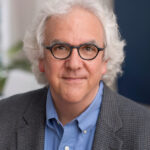A growing body of literature is looking at the objective benefits of participating in narrative medicine programs, and these include improvements in teamwork skills, reduction of burnout, enhanced interprofessional communication and collaboration, and a sense of restoring meaning in medical practice.1 Other skills associated with narrative medicine training include building the ability to tolerate ambiguity, improving reflective practice and introspection, and picking up on details and clues in stories that may otherwise be missed.
Journalism Skills

Stephen Fried
The second speaker was Stephen Fried, BA, director, Columbia Narrative Medicine Journalism Workshop, New York, and lecturer, University of Pennsylvania Center for Programs in Contemporary Writing, Philadelphia. Mr. Fried, an award-winning journalist and The New York Times best-selling author, was precisely the right person to provide guidance to audience members hoping to be the next Atul Gawande or Siddhartha Mukherjee. Mr. Fried explained that narrative medicine journalism places an emphasis on that last word—journalism—and requires doctors to learn skills and acquire habits that may initially feel foreign or counterintuitive to them. Physicians must commit to true reporting, which includes the gathering of background/explanatory information and being aware of what is currently in the news that is relevant to the subject they are writing about. Mr. Fried cautioned that, even if doctors are leaders in their fields, they must still do the hard work of reporting to best be able to tell readers what they need to know.
Aspiring physician-journalists must also recognize the difference between writing for oneself to become a better clinician and writing/narrating on the same subject for a lay readership. Physicians must understand their own voice as a writer, develop this voice and know when to use—or not use—this voice in their writing. They must also be able to access and use the voices of others, which typically requires interviewing patients and others, rather than just writing based on what they remember happening. A skilled medical journalist can observe and re-create actual scenes, and this may mean going back to the place where an event took place.
Truly great medical journalists are continually asking themselves: What is going to be the next big thing? This question may apply both to improving a specific piece by exploring uncharted territory as well as developing ideas for future pieces. (Mr. Fried recommends that doctors keep a running list of the Big 5 items that they want to write about next.) A key concept in general is writing in a way that is personal to the reader rather than just personal to the physician writing the piece.



